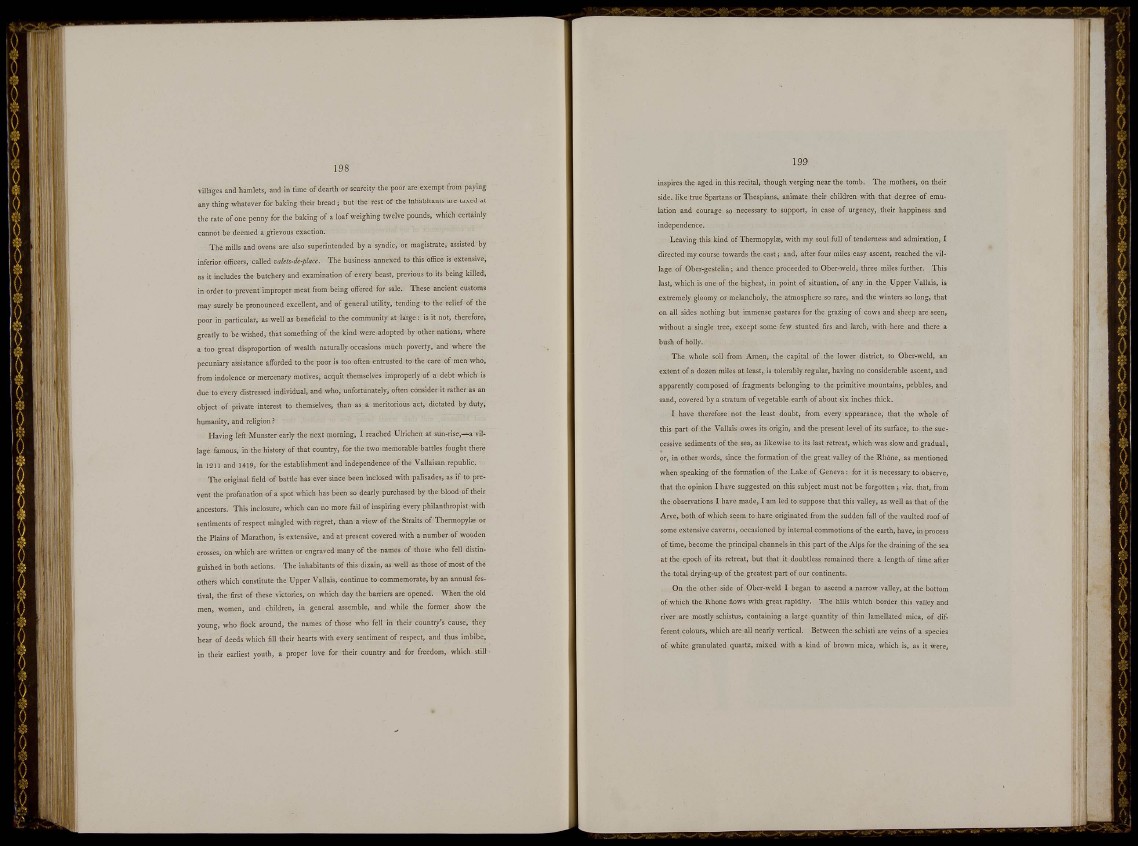
villages and hamlets, and in time of dearth or scarcity the poor are exempt from paying
any thing whatever for baking their bread; but the rest of the inhabitants are taxed at
the rate of one penny for the baking of a loaf weighing twelve pounds, which ccrtamly
cannot be deemed a grievous exaction.
The mills and ovens are also superintended by a syndic, or magistrate, assisted by
inferior officers, called valets-de-place. The business annexed to this office is extensive,
as it includes the butchery and examination of every beast, previous to its being killed,
in order to prevent improper meat from being offered for sale. These ancient customs
may surely be pronounced excellent, and of general utility, tending to the relief of the
poor in particular, as well as beneficial to the community at large: is it not, therefore,
greatly to be wished, that something of the kind were adopted by other nations, where
a too great disproportion of wealth naturally occasions much poverty, and where the
pecuniary assistance afforded to the poor is too often entrusted to the care of men who,
from Indolence or mercenary motives, acquit themselves improperly of a debt which is
due to every distressed individual, and who, unfortunately, often consider it rather as an
object of private interest to themselvesj than as a meritorious act, dictated by duty,
humanity, and religion?
Having reft Munster early the next morning, I reached Ulrichen at sün-rise,^a village
famous, in the history of that country, for the two memorable battles fought there
in 1211 and 1419, for the establishment and independence of the Vallaisan republic.
The original field of battle has ever since been inclosed with palisades, as if to prevent
the profanation of a spot which has been so dearly purchased by the blood of their
ancestors. This inclosure, which can no more fail of inspiring every philanthropist with
sentiments of respect mingled with regret, than a view of the Straits of Thermopyl^ or
the Plains of Marathon, is extensive, and at present covered with a number of wooden
crosscs, on which are written or engraved many of the names of those who fell distinguished
in both actions. The inhabitants of this dizain, as well as those of most of the
others which constitute the Upper Valíais, continue to commemorate, by an annual festival,
the first of these victories, on which day the barriers are opened. When the old
men, women, and children, in general assemble, and while the former show the
young, who flock around, the names of those who fell in their country's cause, they
hear of deeds which fill their hearts with every sentiment of respect, and thus imbibe,
in their earliest youth, a proper love for their country and for freedom, which still
inspires the aged in this recital, though verging near the tomb. The motliers, on their
side, like true Spartans or Thespians, animate their children with that degree of emulation
and courage so necessary to support, in case of urgency, their happiness and
independence.
Leaving this kind of Thermopylíe, with my soul full of tenderness and admiration, I
directed my course towards the east; and, after four miles easy ascent, reached the village
of Ober-gestelin ; and thence proceeded to Ober-weld, three miles further. This
last, which is one of the highest, in point of situation, of any in the Upper Valíais, is
extremely gloomy or melancholy, the atmosphere so rare, and the winters so long, that
on all sides nothing but immense pastures for the grazing of cows and sheep are seen,
without a single tree, except some few stunted firs and larch, with here and there a
bush of holly.
The whole soil from Arnen, the capital of the lower district, to Ober-weld, an
extent of a dozen miles at least, is tolerably regular, having no considerable ascent, and
apparently composed of fragments belonging to the primitive mountains, pebbles, and
sand, covered by a stratum of vegetable earth of about six inches thick.
I have therefore not the least doubt, from every appearance, that the whole of
this part of the Valíais owes its origin, and the present level of its surface, to the successive
sediments of the sea, as likewise to its last retreat, which was slow and gradual,
or, in other words, since the formation of the great valley of the Rhône, as mentioned
when speaking of the formation of the Lake of Geneva : for it is necessary to observe,
that the opinion I have suggested on this subject must not be forgotten ; viz. that, from
the observations I have made, I am led to suppose that this valley, as well as that of the
Arve, both of which seem to have originated from the sudden fall of the vaulted roof of
some extensive caverns, occasioned by internal commotions of the earth, have, in process
of time, become the principal channels in this part of the Alps for the draining of the sea
at the epoch of its retreat, but that it doubtless remained there a length of time after
the total drying-up of the greatest part of our continents.
On the other side of Ober-weld I began to ascend a narrow valley, at the bottom
of which the Rhône flows with great rapidity. The hills which border this valley and
river are mostly schistus, containing a large quantity of thin lamellated mica, of different
colours, which are all nearly vertical. Between the schisti are veins of a species
of white granulated quartz, mixed with a kind of brown mica, which is, as it %vere,
|<!llil
fli